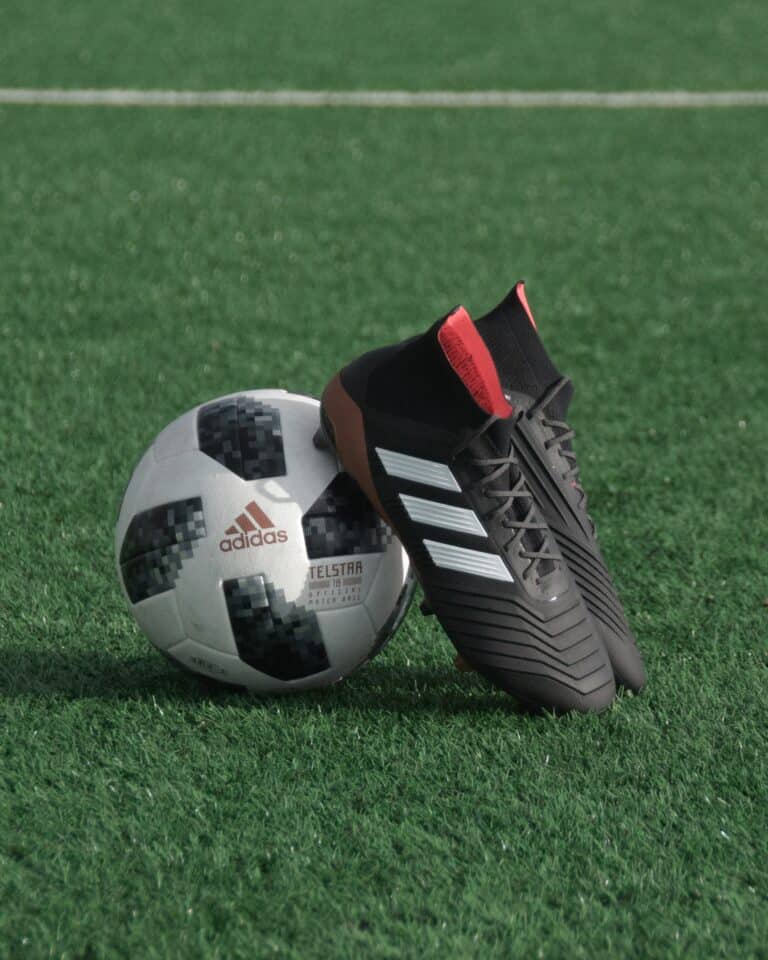Soccer Nutrition 101 – A Comprehensive Guide
Soccer is an extremely competitive sport and if you want to get better as a soccer player, then you will have to continuously try to gain a competitive edge over your competitors. Yes, improving your technical skills and your fitness is important but you should also focus on an important aspect that most players tend to ignore – nutrition.
By fueling your body with the right foods and drinks, you can unlock your true potential on the field. When you consume the right nutrients, you will be able to enhance your energy levels, improve endurance, support muscle repair, and ultimately see improved results on the field.
What Nutrients Do Soccer Players Need?

Soccer players, just like any other individual, benefit from a balanced diet that includes all the necessary nutrients. However, the unique demands of their sport may require different proportions and quantities of macronutrients compared to non-athletes. By focusing on tailored nutrition, soccer players can optimize their performance and fuel their bodies for success on the field.
Let us go over the key nutrients that are needed for soccer players. By understanding why these nutrients are needed, you will get a better idea about how to optimize your diet in a better way.
Carbohydrates
Soccer is an intense sport that demands high levels of energy. Carbohydrates are the primary fuel source for the body, providing the energy needed for sprinting, running, and endurance. Opt for complex carbohydrates such as whole grains, fruits, and vegetables to sustain energy levels throughout training sessions and matches.
Protein
Proteins are essential for muscle repair and growth, as well as for supporting the immune system. Soccer players need adequate protein intake to repair and rebuild muscles after intense workouts and matches. Lean sources like chicken, fish, beans, and tofu are excellent options to meet protein requirements.
Fats
While fats have often been misunderstood, they play a crucial role in soccer performance. Healthy fats provide long-lasting energy, support brain function, and aid in nutrient absorption. Include sources like avocados, nuts, seeds, and olive oil in your diet for a balanced intake of fats.
Vitamins
Soccer players need a variety of vitamins to support overall health and optimize performance. Vitamin C helps boost the immune system, while vitamin D aids in bone health and muscle function. B vitamins, such as B12 and folate, are important for energy metabolism. Ensure a colorful and diverse diet with plenty of fruits, vegetables, and whole grains to obtain a wide range of vitamins.
Minerals
Minerals are vital for various physiological functions and muscle contractions. Calcium is essential for strong bones, iron helps transport oxygen to muscles, and magnesium aids in muscle relaxation and energy production. Incorporate dairy products, leafy greens, lean meats, and legumes to meet your mineral needs.
Hydration
Even though water has no macronutrients, it is still a necessary component that some players ignore. Proper fluid intake before, during, and after training sessions and matches will have numerous benefits to athletes. Proper hydration helps regulate body temperature, maintain performance, and prevent dehydration.
You should aim to drink water regularly whether you’re an athlete or not. Soccer players can even consider sports drinks for prolonged and intense physical activities to replenish their lost electrolytes.
Pre-Match Nutrition – What to Eat Before a Match/Training?

Before a match or a training session, the athlete should look to consume an ample amount of carbohydrates. Likewise, make sure to consume protein along with vitamins and minerals. Proper pre-match nutrition is essential to ensure optimal energy levels, enhance performance, and sustain endurance during a soccer match. Here are some practical examples and meal plans to help you fuel your body effectively before the big game:
Timing of Pre-Match Meals
Aim to have your pre-match meal 2-4 hours before kick-off to allow for proper digestion. If time is limited, a smaller snack can be consumed 1-2 hours before the game.
Carbohydrate Loading
For longer matches or intense tournaments, consider carbohydrate loading in the days leading up to the event. This involves increasing your carbohydrate intake to maximize glycogen stores in the muscles.
Optimal Pre-Match Meal Options:
- Whole Grain Pasta with Lean Protein: Enjoy a serving of whole grain pasta topped with lean protein sources such as grilled chicken or turkey. Include some steamed vegetables for added nutrients.
- Rice Bowl with Beans and Veggies: Create a nourishing rice bowl by combining cooked brown rice, black beans, roasted vegetables, and a drizzle of olive oil for healthy fats.
- Quinoa Salad with Salmon: Prepare a refreshing quinoa salad with mixed greens, cherry tomatoes, cucumbers, and grilled salmon. Drizzle with a light vinaigrette dressing.
- Turkey or Veggie Wrap: Make a satisfying wrap using whole-grain tortillas filled with sliced turkey or a variety of grilled vegetables. Add some avocado slices for healthy fats.
Hydration
This goes without saying; you need to be properly hydrated before you involve yourself in physical activity. Hydration is quite important before a match because it helps maintain optimal performance on the field. When you’re playing soccer, you will lose a lot of fluids from your body through sweating.
This is why it is important to drink plenty of water in the hours leading up to the game and consider consuming a sports drink or electrolyte-rich beverage closer to kick-off.
Pre-Match Meal Ideas: (3-4 hours before the match/training)
- Whole Grain Pasta with Lean Protein
- Whole grain pasta with grilled chicken or turkey
- Steamed broccoli and carrots on the side
- Water or a diluted sports drink
1-2 hours before the match (snack option): Energy-Boosting Smoothie
- Blend together a banana, almond milk, a scoop of protein powder, and a tablespoon of nut butter
- Pair with a small handful of mixed nuts or a granola bar
- Water or a sports drink
Remember, it’s important to listen to your body and make adjustments based on your personal preferences and dietary restrictions. Experiment with different meal options and find what works best for you. Pre-match nutrition should focus on providing sustained energy, promoting hydration, and avoiding heavy or greasy foods that may cause discomfort during the game.
What to Eat During the Match/Training?

Maintaining energy levels and hydration during a soccer match is vital for optimal performance and endurance. Here are some practical examples and strategies for effective during-the-match nutrition:
Hydration
Stay hydrated throughout the game by sipping on fluids regularly. Aim to drink water or a sports drink during breaks in play, halftime, and whenever necessary. Monitor your urine color as a general indicator of hydration, aiming for pale yellow or clear urine.
Sports Drinks and Electrolyte Replenishment
During longer or intense matches, consider consuming a sports drink to replenish electrolytes lost through sweat. These beverages provide carbohydrates and essential minerals that help maintain energy levels and support muscle function.
Snacks for Sustained Energy
Consuming small, easily digestible snacks during the match can provide quick energy boosts. Here are some examples:
- Energy Bars: Choose energy bars that are low in added sugars and high in complex carbohydrates. Look for bars that contain a mix of protein, healthy fats, and fiber for sustained energy release.
- Fresh Fruits: Opt for fruits like bananas, oranges, or grapes that are easy to carry and provide a combination of natural sugars, vitamins, and hydration.
- Nuts and Seeds: Pack a small handful of mixed nuts or seeds such as almonds, walnuts, or pumpkin seeds. These provide a good source of healthy fats, protein, and minerals.
Remember to choose snacks that are easily portable, non-perishable, and do not cause digestive discomfort during physical activity.
During the Match Nutrition Ideas
- Hydration: Sip on water or a sports drink during breaks in play, halftime, and when feeling thirsty.
- Halftime snack: Have an energy bar or a piece of fruit to replenish energy levels.
- Additional snacks (if needed): During extended breaks or when feeling fatigued, consume a small handful of nuts or seeds for sustained energy.
Note: It’s important to personalize your during-the-match nutrition based on your individual preferences, tolerance, and specific needs. Experiment with different snacks and hydration strategies during training sessions to find what works best for you.
Post-Match Recovery – What to Eat After a Match/Training Session?

Optimizing post-match nutrition is essential for aiding muscle recovery, replenishing energy stores, and promoting overall recovery. It plays a crucial role in repairing muscle damage, replenishing glycogen stores, and facilitating optimal recovery.
Consuming the right nutrients after a match can enhance recovery, reduce muscle soreness, and prepare your body for future training or matches. Here are practical examples and guidelines for effective post-match recovery nutrition:
Carbohydrate and Protein Ratios
Consuming a combination of carbohydrates and protein within the first hour after the match is important for optimal recovery. Aim for a ratio of around 3:1 or 4:1 (carbohydrates to protein) to replenish glycogen stores and aid muscle repair.
Timing of Post-Match Meals
Try to consume a post-match meal or snack within 1-2 hours after the game to provide your body with essential nutrients when it’s most receptive to absorption and recovery.
Ideal Recovery Foods
Focus on including the following nutrient-rich foods in your post-match recovery meals:
- Complex Carbohydrates: Opt for whole grains, sweet potatoes, or quinoa to replenish glycogen stores and provide sustained energy.
- Lean Proteins: Choose lean sources such as grilled chicken, fish, tofu, or Greek yogurt to support muscle repair and growth.
- Anti-Inflammatory Foods: Include foods with natural anti-inflammatory properties, such as berries, leafy greens, turmeric, and ginger, to reduce muscle inflammation and aid in recovery.
Post-Match Recovery Meal Ideas
- Grilled chicken or tofu stir-fry with brown rice: Combine grilled chicken breast or tofu with a variety of colorful vegetables like broccoli, bell peppers, and carrots. Serve over a bed of brown rice for a well-rounded recovery meal.
- Quinoa salad with salmon: Prepare a quinoa salad with mixed greens, cherry tomatoes, cucumbers, and grilled salmon. Drizzle with a light vinaigrette dressing and serve as a refreshing post-match meal.
- Protein smoothie bowl: Blend together a scoop of protein powder, a frozen banana, spinach, almond milk, and a tablespoon of nut butter. Top with fresh fruits, nuts, and seeds for added nutrients and enjoy as a satisfying recovery option.
Remember to hydrate adequately during the post-match period as well, by drinking water or a sports drink to replenish fluids and electrolytes lost during the game.
Note: These are just a few examples of post-match recovery meals. Customize your post-match nutrition based on your preferences and dietary needs. Experiment with different food combinations and listen to your body’s signals to determine what works best for you.
Sports Supplements for Soccer Players
While a well-rounded diet should be the foundation of a soccer player’s nutrition plan, certain sports supplements can complement their performance and recovery goals. Sports supplements are products designed to enhance athletic performance, improve recovery, and support overall health. However, it’s important to note that supplements are not a substitute for a balanced diet and should be used judiciously.
Here are some sports supplements commonly used by soccer players:
Supplements for Energy and Performance
- Caffeine: Caffeine can increase alertness and improve endurance performance. It’s available in various forms such as coffee, energy drinks, or caffeine supplements. In my opinion, the best form of caffeine that you can consume is plain black coffee. However, it’s important to consume caffeine in moderation and consider individual sensitivity.
- Creatine: Creatine is known to improve strength, power, and sprint performance. It’s commonly used in short, high-intensity activities like soccer. Consult with a healthcare professional or sports dietitian before using creatine to ensure safe and effective use. In most cases, creatine is generally safe to consume as it is the second most researched supplement in the world.
Supplements for Recovery and Injury Prevention
- Protein Powders: Protein powders can help meet increased protein needs for muscle repair and recovery. Whey protein is a popular option due to its quick absorption, while plant-based protein powders provide alternatives for those with dietary restrictions.
- Omega-3 Fatty Acids: Omega-3 supplements, such as fish oil capsules, can help reduce inflammation, support joint health, and aid in recovery. However, it’s important to obtain omega-3s from whole food sources like fatty fish, chia seeds, or flaxseeds whenever possible.
It’s crucial to approach sports supplements with caution and seek professional guidance before incorporating them into your routine. Consulting with a registered dietitian, sports nutritionist, or healthcare provider can help determine which supplements, if any, are appropriate for your individual needs.
Remember, sports supplements should be used as a complement to a well-balanced diet and proper training regimen. They are not a magic solution and cannot replace the benefits of consistently making good dietary choices and engaging in appropriate physical conditioning.
Conclusion
To wrap things up, proper nutrition plays a vital role in optimizing your soccer performance. Focus on consuming a balanced diet, staying hydrated, and seeking professional guidance for personalized nutrition plans. Also, make sure to listen to your body, be consistent, and make sure to implement proper soccer nutrition to elevate your game and achieve your goals on the field.
If you want to learn more about soccer nutrition, you can check these articles out:







